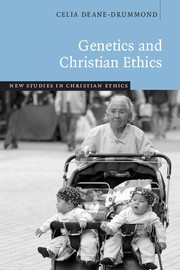Book contents
- Frontmatter
- Contents
- General Editor's preface
- Acknowledgments
- Introduction
- 1 A recovery of virtue for the ethics of genetics
- 2 Theological principles
- 3 Living in the shadow of eugenics
- 4 Genetic testing and screening
- 5 Genetic counselling
- 6 Gene therapies
- 7 Gene patenting
- 8 Women and genetic technologies
- 9 Genetics and environmental concern
- Postscript: Concluding remarks
- Bibliography
- Index
7 - Gene patenting
Published online by Cambridge University Press: 05 June 2012
- Frontmatter
- Contents
- General Editor's preface
- Acknowledgments
- Introduction
- 1 A recovery of virtue for the ethics of genetics
- 2 Theological principles
- 3 Living in the shadow of eugenics
- 4 Genetic testing and screening
- 5 Genetic counselling
- 6 Gene therapies
- 7 Gene patenting
- 8 Women and genetic technologies
- 9 Genetics and environmental concern
- Postscript: Concluding remarks
- Bibliography
- Index
Summary
Patenting of genes, whether of non-human or human origin, raises strong reactions both within and outside the Christian community. There are some who argue vehemently that nothing living or of biological origin should be subject to patent law. Others argue, equally passionately, that without patent protection the funding for expensive research and development would be impossible. There are philosophical and religious reasons why many oppose patenting of life forms. These include, for example, the contention that knowledge and ‘life’ can never be treated as ‘property’. Religious opposition can either focus on the idea of going beyond acceptable limits, similar in tone to objections to gene therapy, or raise broader concerns about the common good and about justice issues in terms of access to those goods. The resistance to outright, absolute objections to DNA patenting has shifted the discussion to more specific questions about the consequences of DNA patenting and its scope. For the purposes of this chapter I will outline more precisely what patenting law entails and contrast the position in the United States with that in the European Union when dealing with biological materials. Case studies, especially controversies surrounding the patenting of stem cells, help to illustrate the limitations of the legal frameworks developed in Europe and the United States. I will also seek to address the question of how far the churches have sought to influence developments, and, in the light of wider issues covered under the TRIPS (Trade Related Intellectual Property) Agreement, consider the suggestion of the Human Genome Organisation (HUGO) about benefit-sharing.
- Type
- Chapter
- Information
- Genetics and Christian Ethics , pp. 160 - 190Publisher: Cambridge University PressPrint publication year: 2005

